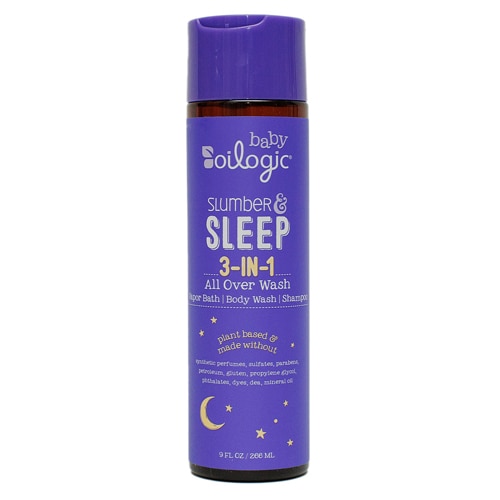Bedtime with a baby can feel like Russian roulette. Some nights go smoothly, while others involve hours of pushback and tantrums. While it may feel like luck of the draw, there are steps you can take to enjoy more of the easy nights (and fewer bedtime scaries). Here’s how you can create a relaxing baby bedtime routine that promotes a good night’s rest for the whole family.
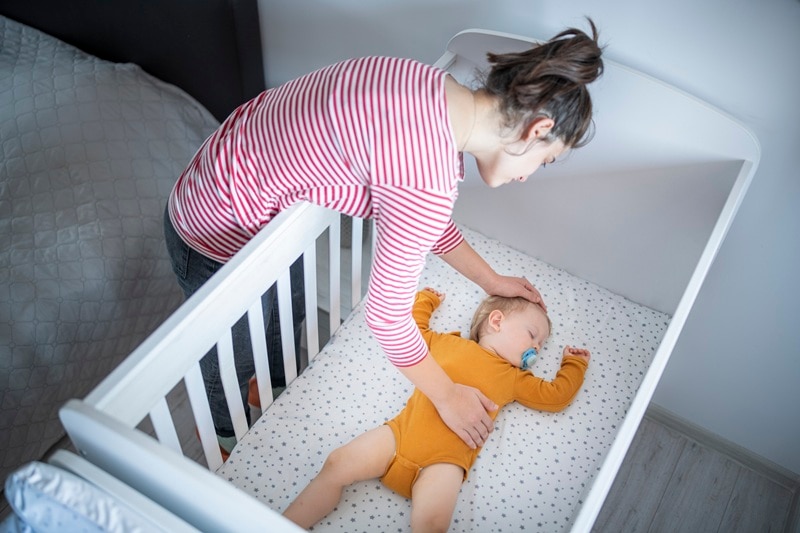
Baby Bedtime Routine: Tips for Better Sleep
If solid sleep has become a foreign concept in your household, it may be time to establish a calming baby bedtime routine. Curating a routine that your little one can rely on each night makes it easier for them to transition into sleep. Use these tips to help them learn good habits that will promote better sleep hygiene for their whole life.
How much should my baby be sleeping?
A baby's sleep schedule by age can vary. It’s common for babies not to sleep through the night (especially when they’re younger), but a solid baby bedtime routine can encourage longer stretches of sleep between feeds and a better night for the whole family. If you feel like your baby isn’t getting enough sleep, try these tips to turn bedtime into a success.
Structuring your baby’s bedtime routine
Every child is different, and you know your baby best. However, here’s a sample baby bedtime routine that can promote better rest and
sleep hygiene for your little one.
Wind down early
Give enough time for your baby to relax and wind down before putting them down to sleep. This doesn’t need to be an hours-long ordeal but giving them ample time to calm down is key. Wind-down time can include gentle music, reading stories, bathtime — anything that isn’t too overstimulating. Even 20 to 30 minutes of quiet activities can make a big difference.
Develop a routine
Create a routine you and your little one both enjoy that can be repeated every night. This signals to your baby that it’s time to go to sleep and can include activities like bathtime and lotion, a small bedtime snack, reading a story or cuddles. Find what your baby responds best to and develop a routine that works well for the whole family.
Create a solid sleep environment
Set your little one up for success with an environment that encourages a restful night of sleep. A dark room at a comfortable temperature is key, and you can incorporate additional sleep aids like a white noise machine or
aromatherapy to help them fall sound asleep in no time.
The Best Products to Support a Relaxing Baby Bedtime Routine
Once you’ve mapped out your routine, the right products can make bedtime feel smoother and more enjoyable. From the bathtub to the diaper changing station, here are some parent-approved favorites to create a relaxing baby bedtime routine and soothe your little one to sleep.
Bathtime Essentials
Oilogic Baby Slumber & Sleep 3-IN-1 All Over Wash Vapor Bath Body Wash Shampoo
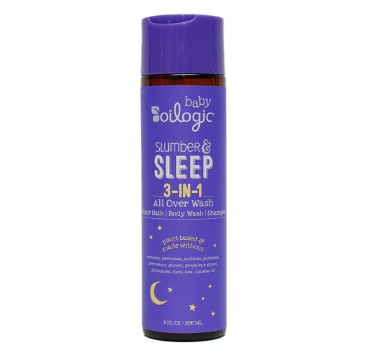
Oilogic’s 3-in-1 wash utilizes a natural blend of pure essential oils like lavender and chamomile to bring relaxation to your baby bedtime routine. It’s gluten-free, vegan, cruelty-free and formulated without parabens, phthalates, sulfates, DEA, dyes, artificial colors, mineral oil, synthetic perfumes or petroleum.
Aura Cacia Kids Fizzy Bath Kit 3 Packets

Make bathtime more fun with Aura Cacia’s fizzy bath kit. Made cruelty-free without parabens, synthetic fragrances, colors or preservatives, these gentle bath fizz packets are safe for little ones. They’re enriched with pure essential oils, coconut-derived surfactants and hydrating jojoba oil to support sensitive skin.
Vitacost - Globaby Baby Liquid Castile Soap Unscented

This vegan liquid castile soap is specifically formulated for baby skin, crafted with nourishing ingredients like organic shea butter, olive oil and rosemary extract, which leave skin soft to the touch. It can be used on the hair or skin, gently cleansing without stripping any natural oils, and is made without animal testing, fragrances, parabens, sulfates or artificial colors.
Skincare & Comfort
Earth Mama Baby Organic Diaper Balm

Banish diaper rash with Earth Mama’s organic diaper balm. This herbal blend of calendula, chickweed, St. John’s wort and plantain soothes and protects delicate skin from irritation. Made without petroleum, preservatives, plastic, artificial fragrance, lanolin or zinc, this top-tier ingredient list is chosen by hospital NICUs as a safe and effective option. It’s USDA certified organic, non-GMO, dermatologist and pediatrician-tested, plastic-neutral and Leaping Bunny Certified.
Caboo Baby Wipes Jumbo Unscented

These baby wipes are a game-changer for diaper changing. Made from bamboo, which is fast-growing and sustainable, they’re formulated without parabens, sulfates, chlorine, alcohol, animal testing, phthalates, plastic or formaldehyde. With chamomile, aloe vera and vitamin E, these gentle wipes help to clean and calm sensitive skin.
Bambo Nature Dream Diapers
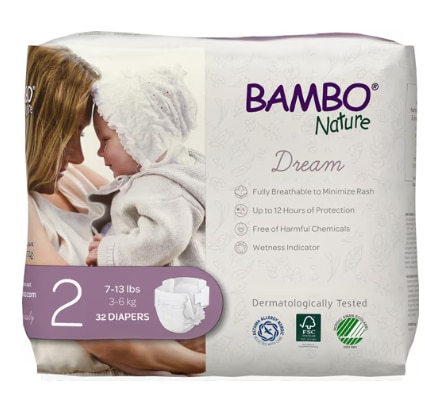
Having the right diapers will help your little one stay dry all night and sleep more soundly. Bambo Nature’s eco-friendly diapers offer up to 12 hours of protection and are made without harmful chemicals like phthalates, parabens, preservatives, fragrance, chlorine or lotions. They’re designed to eliminate diaper rash and are ultra-absorbent with three layers to withstand multiple wettings.
Burt's Bees Baby Nourishing Lotion Calming Lavender
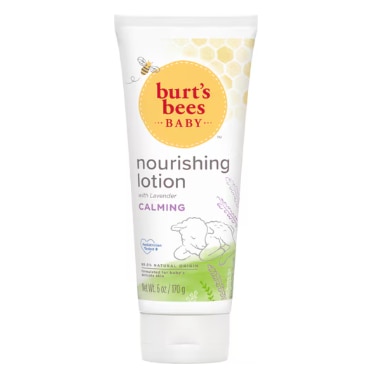
Burt’s Bees’ calming baby lotion soothes babies to sleep while softening the skin with relaxing lavender, vanilla and shea butter. It’s safe, natural, cruelty-free, hypoallergenic, pediatrician-tested and made without SLS, phthalates, parabens or petrolatum to gently nourish sensitive skin.
Soothing Sleep Aids
Aura Cacia Kids Bedtime Aromatherapy Roll-on Lavender Citrus
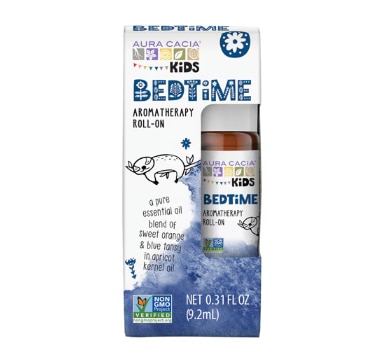
Aura Cacia’s roll-on aromatherapy is crafted from a pure essential oil blend of sweet orange, blue tansy, lavender, frankincense and citrus in apricot oil. This grounding floral and citrus scent is vegan, cruelty-free, non-GMO and from a pure botanical source.
Oilogic Baby Slumber & Sleep Essential Oil Linen Mist
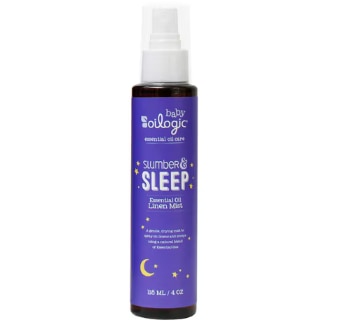
Bring aromatherapy into your nighttime routine with Oilogic’s essential oil linen mist. This 100% natural spray uses lavender and chamomile oil to calm little ones and set the atmosphere for a night of deep sleep. It’s cruelty-free and formulated without gluten, parabens, phthalates, sulfates, dyes, DEA, mineral oil, synthetic perfumes or artificial colors.
Extras for Peace of Mind
Attitude Baby Leaves Training Toothpaste Fluoride Free Strawberry
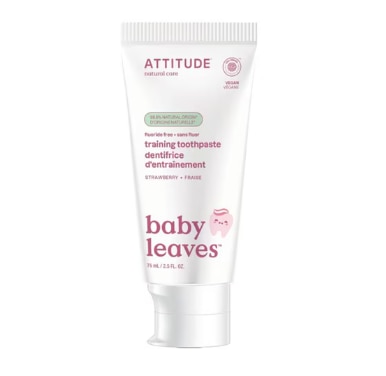
Attitude’s fluoride-free training toothpaste is a natural, swallow-safe option perfect for teaching dental hygiene to kids. This hypoallergenic formula is made with antibacterial green tea leaves and papaya to brush away plaque. It’s EWG-verified, vegan, cruelty-free, paraben-free and phthalate-free.
Nordic Naturals Kids Calm Gummies Strawberry Watermelon
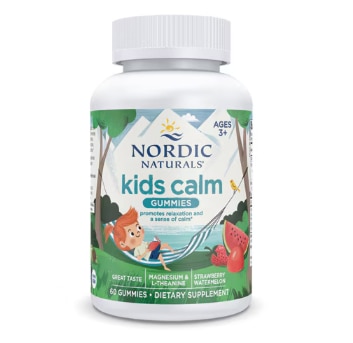
Incorporate these tasty gummies into your little one’s bedtime routine as an easy way to help them unwind. With magnesium and L-theanine, these non-melatonin gummies provide a sense of calm while delivering micronutrient support. They’re third-party tested, non-GMO, vegan, gluten-free, dairy-free, synthetic-dye free and safe for ages three and up to be taken daily.
There’s no way to guarantee a perfect bedtime every night, but consistency and the right environment make all the difference. With a blend of a soothing routine, a calming sleep space, and help from a few trusted products, your little one will be sleeping better in no time.
 Oilogic’s 3-in-1 wash utilizes a natural blend of pure essential oils like lavender and chamomile to bring relaxation to your baby bedtime routine. It’s gluten-free, vegan, cruelty-free and formulated without parabens, phthalates, sulfates, DEA, dyes, artificial colors, mineral oil, synthetic perfumes or petroleum.
Aura Cacia Kids Fizzy Bath Kit 3 Packets
Oilogic’s 3-in-1 wash utilizes a natural blend of pure essential oils like lavender and chamomile to bring relaxation to your baby bedtime routine. It’s gluten-free, vegan, cruelty-free and formulated without parabens, phthalates, sulfates, DEA, dyes, artificial colors, mineral oil, synthetic perfumes or petroleum.
Aura Cacia Kids Fizzy Bath Kit 3 Packets
 Make bathtime more fun with Aura Cacia’s fizzy bath kit. Made cruelty-free without parabens, synthetic fragrances, colors or preservatives, these gentle bath fizz packets are safe for little ones. They’re enriched with pure essential oils, coconut-derived surfactants and hydrating jojoba oil to support sensitive skin.
Vitacost - Globaby Baby Liquid Castile Soap Unscented
Make bathtime more fun with Aura Cacia’s fizzy bath kit. Made cruelty-free without parabens, synthetic fragrances, colors or preservatives, these gentle bath fizz packets are safe for little ones. They’re enriched with pure essential oils, coconut-derived surfactants and hydrating jojoba oil to support sensitive skin.
Vitacost - Globaby Baby Liquid Castile Soap Unscented
 This vegan liquid castile soap is specifically formulated for baby skin, crafted with nourishing ingredients like organic shea butter, olive oil and rosemary extract, which leave skin soft to the touch. It can be used on the hair or skin, gently cleansing without stripping any natural oils, and is made without animal testing, fragrances, parabens, sulfates or artificial colors.
This vegan liquid castile soap is specifically formulated for baby skin, crafted with nourishing ingredients like organic shea butter, olive oil and rosemary extract, which leave skin soft to the touch. It can be used on the hair or skin, gently cleansing without stripping any natural oils, and is made without animal testing, fragrances, parabens, sulfates or artificial colors.
 Banish diaper rash with Earth Mama’s organic diaper balm. This herbal blend of calendula, chickweed, St. John’s wort and plantain soothes and protects delicate skin from irritation. Made without petroleum, preservatives, plastic, artificial fragrance, lanolin or zinc, this top-tier ingredient list is chosen by hospital NICUs as a safe and effective option. It’s USDA certified organic, non-GMO, dermatologist and pediatrician-tested, plastic-neutral and Leaping Bunny Certified.
Caboo Baby Wipes Jumbo Unscented
Banish diaper rash with Earth Mama’s organic diaper balm. This herbal blend of calendula, chickweed, St. John’s wort and plantain soothes and protects delicate skin from irritation. Made without petroleum, preservatives, plastic, artificial fragrance, lanolin or zinc, this top-tier ingredient list is chosen by hospital NICUs as a safe and effective option. It’s USDA certified organic, non-GMO, dermatologist and pediatrician-tested, plastic-neutral and Leaping Bunny Certified.
Caboo Baby Wipes Jumbo Unscented
 These baby wipes are a game-changer for diaper changing. Made from bamboo, which is fast-growing and sustainable, they’re formulated without parabens, sulfates, chlorine, alcohol, animal testing, phthalates, plastic or formaldehyde. With chamomile, aloe vera and vitamin E, these gentle wipes help to clean and calm sensitive skin.
Bambo Nature Dream Diapers
These baby wipes are a game-changer for diaper changing. Made from bamboo, which is fast-growing and sustainable, they’re formulated without parabens, sulfates, chlorine, alcohol, animal testing, phthalates, plastic or formaldehyde. With chamomile, aloe vera and vitamin E, these gentle wipes help to clean and calm sensitive skin.
Bambo Nature Dream Diapers
 Having the right diapers will help your little one stay dry all night and sleep more soundly. Bambo Nature’s eco-friendly diapers offer up to 12 hours of protection and are made without harmful chemicals like phthalates, parabens, preservatives, fragrance, chlorine or lotions. They’re designed to eliminate diaper rash and are ultra-absorbent with three layers to withstand multiple wettings.
Burt's Bees Baby Nourishing Lotion Calming Lavender
Having the right diapers will help your little one stay dry all night and sleep more soundly. Bambo Nature’s eco-friendly diapers offer up to 12 hours of protection and are made without harmful chemicals like phthalates, parabens, preservatives, fragrance, chlorine or lotions. They’re designed to eliminate diaper rash and are ultra-absorbent with three layers to withstand multiple wettings.
Burt's Bees Baby Nourishing Lotion Calming Lavender
 Burt’s Bees’ calming baby lotion soothes babies to sleep while softening the skin with relaxing lavender, vanilla and shea butter. It’s safe, natural, cruelty-free, hypoallergenic, pediatrician-tested and made without SLS, phthalates, parabens or petrolatum to gently nourish sensitive skin.
Burt’s Bees’ calming baby lotion soothes babies to sleep while softening the skin with relaxing lavender, vanilla and shea butter. It’s safe, natural, cruelty-free, hypoallergenic, pediatrician-tested and made without SLS, phthalates, parabens or petrolatum to gently nourish sensitive skin.
 Aura Cacia’s roll-on aromatherapy is crafted from a pure essential oil blend of sweet orange, blue tansy, lavender, frankincense and citrus in apricot oil. This grounding floral and citrus scent is vegan, cruelty-free, non-GMO and from a pure botanical source.
Oilogic Baby Slumber & Sleep Essential Oil Linen Mist
Aura Cacia’s roll-on aromatherapy is crafted from a pure essential oil blend of sweet orange, blue tansy, lavender, frankincense and citrus in apricot oil. This grounding floral and citrus scent is vegan, cruelty-free, non-GMO and from a pure botanical source.
Oilogic Baby Slumber & Sleep Essential Oil Linen Mist
 Bring aromatherapy into your nighttime routine with Oilogic’s essential oil linen mist. This 100% natural spray uses lavender and chamomile oil to calm little ones and set the atmosphere for a night of deep sleep. It’s cruelty-free and formulated without gluten, parabens, phthalates, sulfates, dyes, DEA, mineral oil, synthetic perfumes or artificial colors.
Bring aromatherapy into your nighttime routine with Oilogic’s essential oil linen mist. This 100% natural spray uses lavender and chamomile oil to calm little ones and set the atmosphere for a night of deep sleep. It’s cruelty-free and formulated without gluten, parabens, phthalates, sulfates, dyes, DEA, mineral oil, synthetic perfumes or artificial colors.
 Attitude’s fluoride-free training toothpaste is a natural, swallow-safe option perfect for teaching dental hygiene to kids. This hypoallergenic formula is made with antibacterial green tea leaves and papaya to brush away plaque. It’s EWG-verified, vegan, cruelty-free, paraben-free and phthalate-free.
Nordic Naturals Kids Calm Gummies Strawberry Watermelon
Attitude’s fluoride-free training toothpaste is a natural, swallow-safe option perfect for teaching dental hygiene to kids. This hypoallergenic formula is made with antibacterial green tea leaves and papaya to brush away plaque. It’s EWG-verified, vegan, cruelty-free, paraben-free and phthalate-free.
Nordic Naturals Kids Calm Gummies Strawberry Watermelon
 Incorporate these tasty gummies into your little one’s bedtime routine as an easy way to help them unwind. With magnesium and L-theanine, these non-melatonin gummies provide a sense of calm while delivering micronutrient support. They’re third-party tested, non-GMO, vegan, gluten-free, dairy-free, synthetic-dye free and safe for ages three and up to be taken daily.
There’s no way to guarantee a perfect bedtime every night, but consistency and the right environment make all the difference. With a blend of a soothing routine, a calming sleep space, and help from a few trusted products, your little one will be sleeping better in no time.
Incorporate these tasty gummies into your little one’s bedtime routine as an easy way to help them unwind. With magnesium and L-theanine, these non-melatonin gummies provide a sense of calm while delivering micronutrient support. They’re third-party tested, non-GMO, vegan, gluten-free, dairy-free, synthetic-dye free and safe for ages three and up to be taken daily.
There’s no way to guarantee a perfect bedtime every night, but consistency and the right environment make all the difference. With a blend of a soothing routine, a calming sleep space, and help from a few trusted products, your little one will be sleeping better in no time.



